What I’m up to in March 2023
If we met recently and you want to know what I’m up to, this article is for you.
By Hexel Colorado on February 27, 2023
February ends in 48 hours. I can hit two birds with one stone — set my priorities for the month and preemptively answer the rote question of “what are you up to?” — by turning my journal entry of March projects into a blog post.
You might be reading this after meeting in-person recently. If you really want to know what I’m up to, this article is for you.
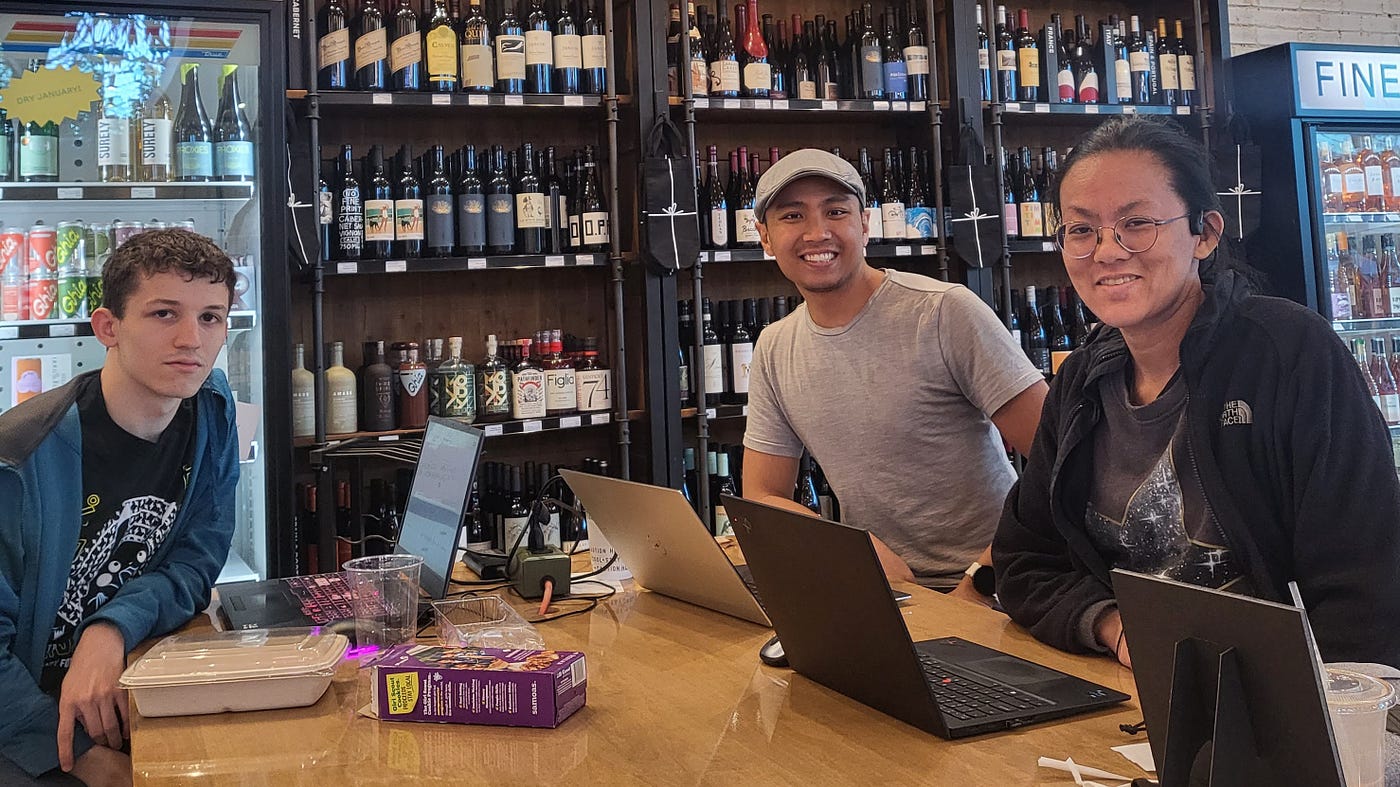 From left to right: Connor Hulla, Hexel Colorado (me), and Angela Tran working on Episode 2 of By Way of Dallas podcast at a coffee shop in Uptown Dallas.
From left to right: Connor Hulla, Hexel Colorado (me), and Angela Tran working on Episode 2 of By Way of Dallas podcast at a coffee shop in Uptown Dallas.
𝐅𝐨𝐜𝐮𝐬 #𝟏: “By Way of Dallas” Podcast
Episode 2 of the By Way of Dallas podcast — Living Car Free in Dallas: Three Stories of People Who Chose to Drive Less — went live in February on all podcast platforms. Angela Tran and Connor Hulla helped a ton with editing. Episode 2 is representative of the format and style listeners can expect of the podcast going forward. Someone complimented that it “felt like Freakonomics Radio” which is exactly what I’m going for.
Episode 3 will be about my story of transitioning from total car-dependence to car-free living. In the 20-minute episode, I’ll reflect on sprawl’s effect on my life as a low-income immigrant family in Dallas, growing up in Fort Worth, and commuting between Irving, Plano, Richardson, and Grand Prairie. The episode ends with how and why I gave up my car fourteen months ago.
I am looking for more stories of people living car-free or car-light in DFW. If you want to share your story for the podcast, please email me at hexelcolorado@gmail.com to schedule a recording session. By publishing these stories in volumes, my ultimate goal is to influence regional transportation planners by dispelling the myth that “more population equals more car traffic.”
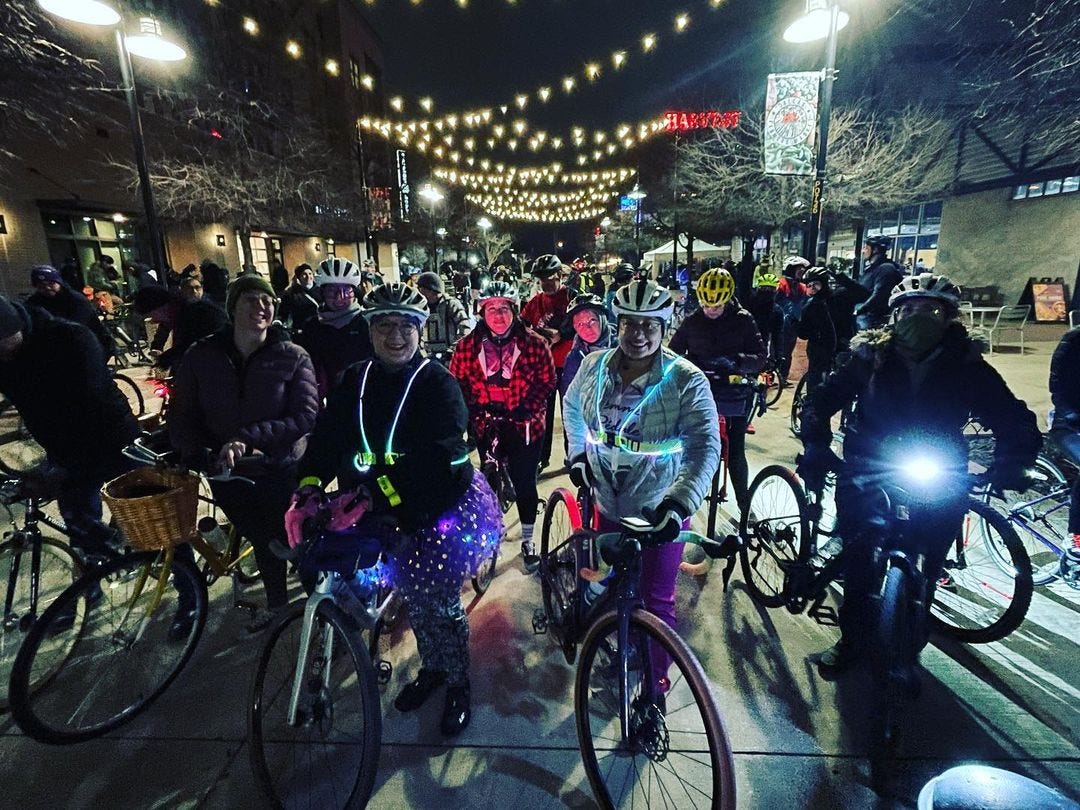 A monthly group ride in Dallas to be featured in Episode 4 of podcast. (@dallasbicycletours on Instagram)
A monthly group ride in Dallas to be featured in Episode 4 of podcast. (@dallasbicycletours on Instagram)
Episode 4 will be about all the weekly/monthly bicycling groups in Dallas. In the 25-minute episode, listeners will learn every free and recurring opportunity to exercise outdoors, make new friends, and explore Dallas on wheels. A purpose of this episode is to demonstrate the viability (and obstacles) of getting around Dallas by bike (or skates) and dispel the myth that nobody wants to travel by bicycle in the city. Here is a spreadsheet of ~15 bike/skate groups to be featured on the podcast episode.
My goal is to publish Episodes 3, 4, 5, and 6 in March.
By month-end, I hope to have a rhythm of airing one episode per week. My first objective this week is to create a production pipeline enabling Connor and Angela to help with upcoming episodes. Below is a preview of my episode topic backlog. I will freeze the backlog at the end of this week to set the scope of season one.
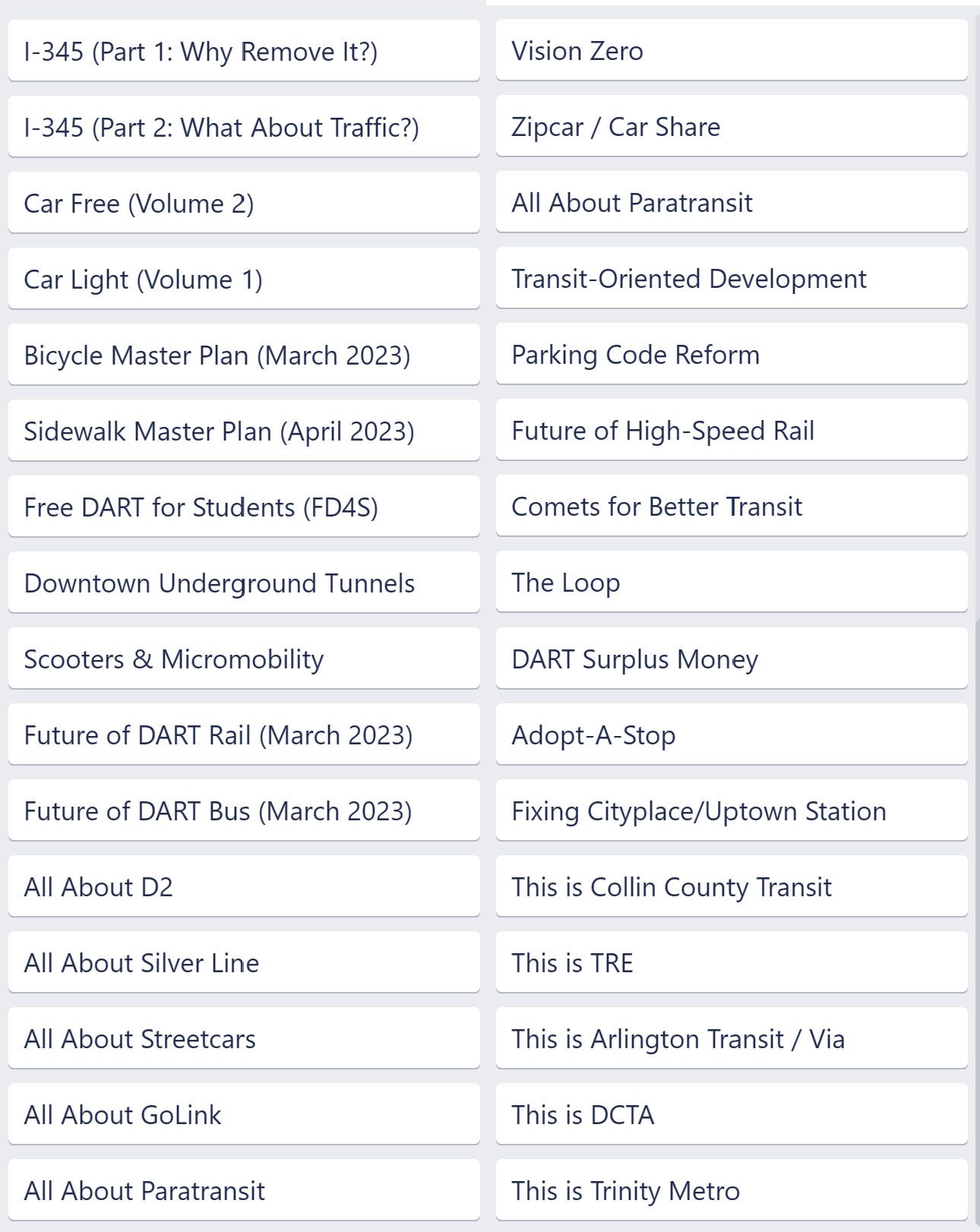
My backlog of podcast topics as of February 27th.
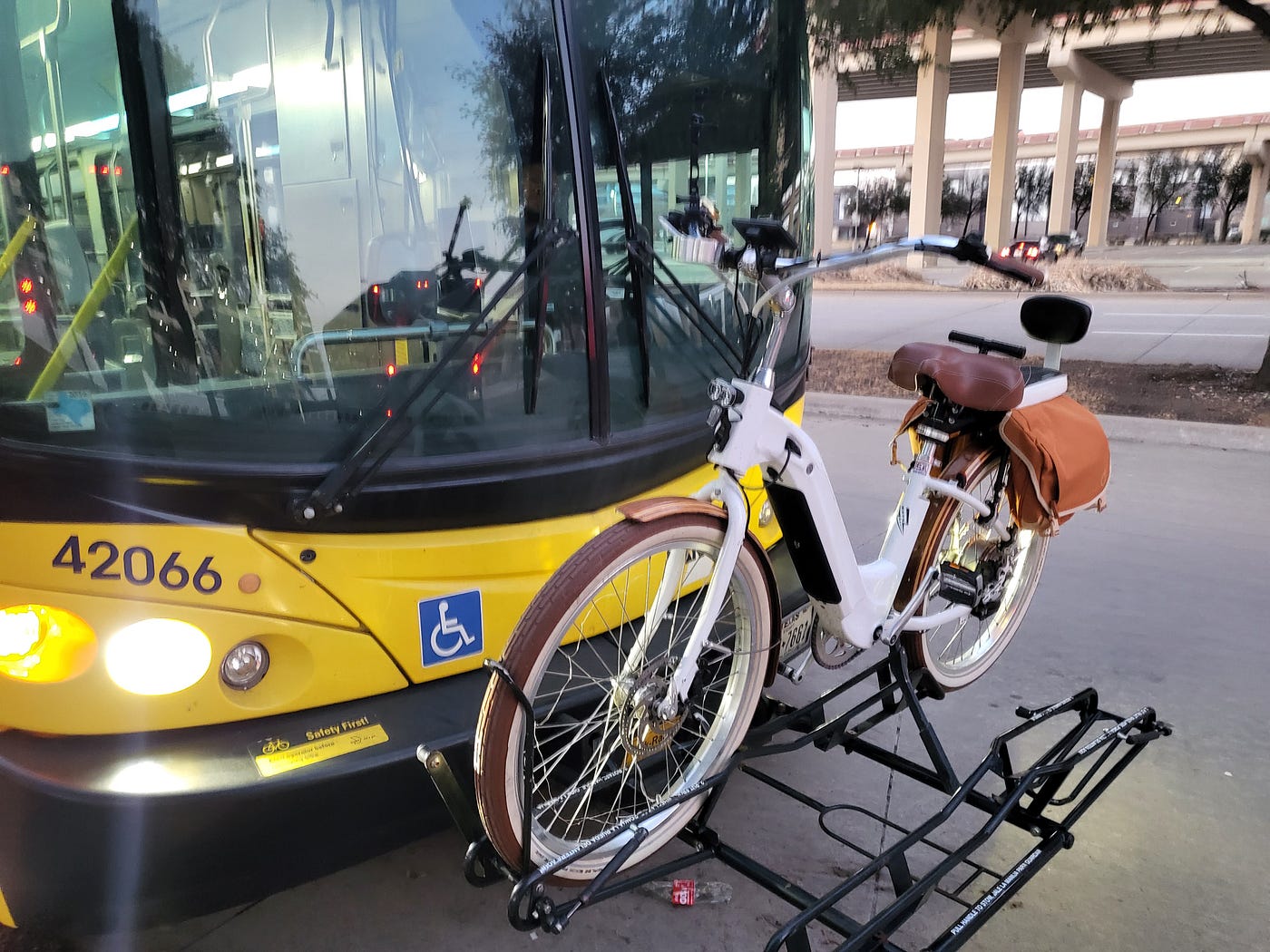 My electric bicycle casually mounted on the bike rack of a DART bus at Cityline/Bush Station.
My electric bicycle casually mounted on the bike rack of a DART bus at Cityline/Bush Station.
𝐅𝐨𝐜𝐮𝐬 #𝟐: DART Citizens Advisory Committee
Last July, I was appointed to DART’s Citizen Advisory Committee (CAC), a non-paid, non-staff, volunteer advisory group. In 2022, I focused on just observing and learning at CAC. Starting in 2023, I’m switching from observing to doing.
In March, I’ll be focused on three CAC projects:
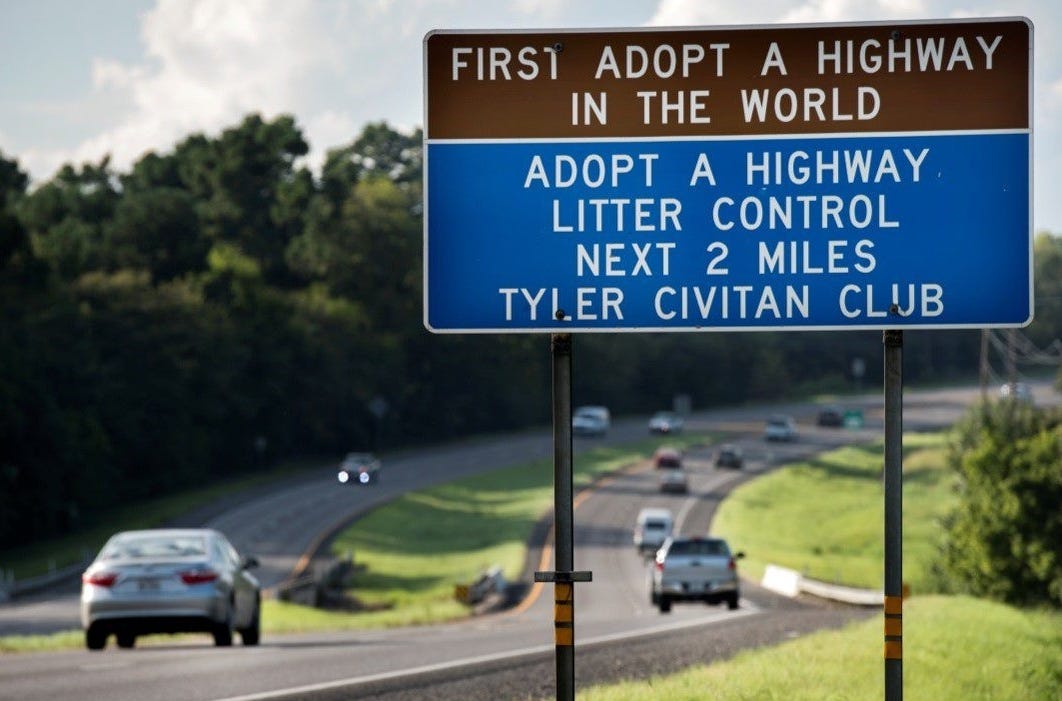
Project #1: revive Adopt-A-Stop program at DART. Everyone is familiar with the phrase “Don’t mess with Texas,” but few know it’s trademarked by TxDOT for the anti-littering campaign they started 38 years. It’s been such a wild success at getting thousands of people to donate time and effort toward cleaning state highways, they hired one of the Jonas Brothers to star in their ad campaigns. Apparently, people are willing to go out of their way to pick up trash for free on a regular basis in exchange for a sense of pride and ownership. Adopt-a-Highway has approximately 3,400 participating groups across the state.
Last year, I learned several weird things. DART is the only transit agency to not have an Adopt-A-Stop program: Trinity Metro, METRO in Houston, and even small towns like Longview (population 81k) have an adoption program.
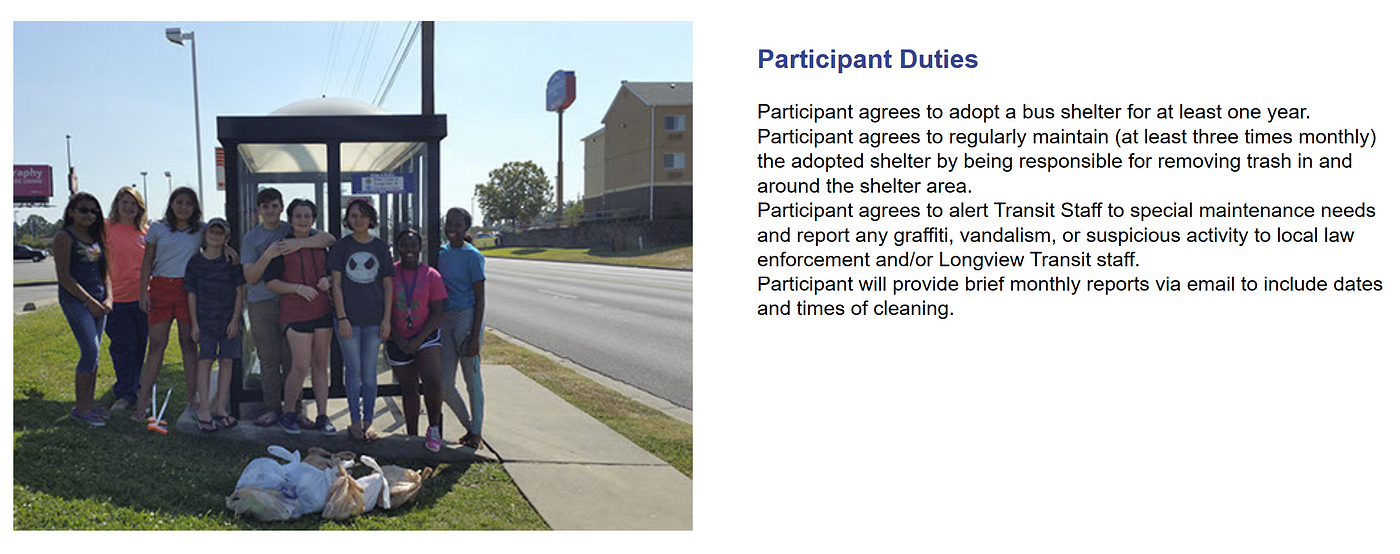 Adopt-A-Stop isn’t unique to big cities and metro areas. Even the small rural town of Longview in East Texas has an Adopt-A-Stop program.
Adopt-A-Stop isn’t unique to big cities and metro areas. Even the small rural town of Longview in East Texas has an Adopt-A-Stop program.
McKinney Avenue Transit Authority (MATA), which operates the M-Line Trolley in Dallas and integrates with DART’s network, has an Adopt-A-Stop program. MATA also happens to be the least subsidized transit service in the country.
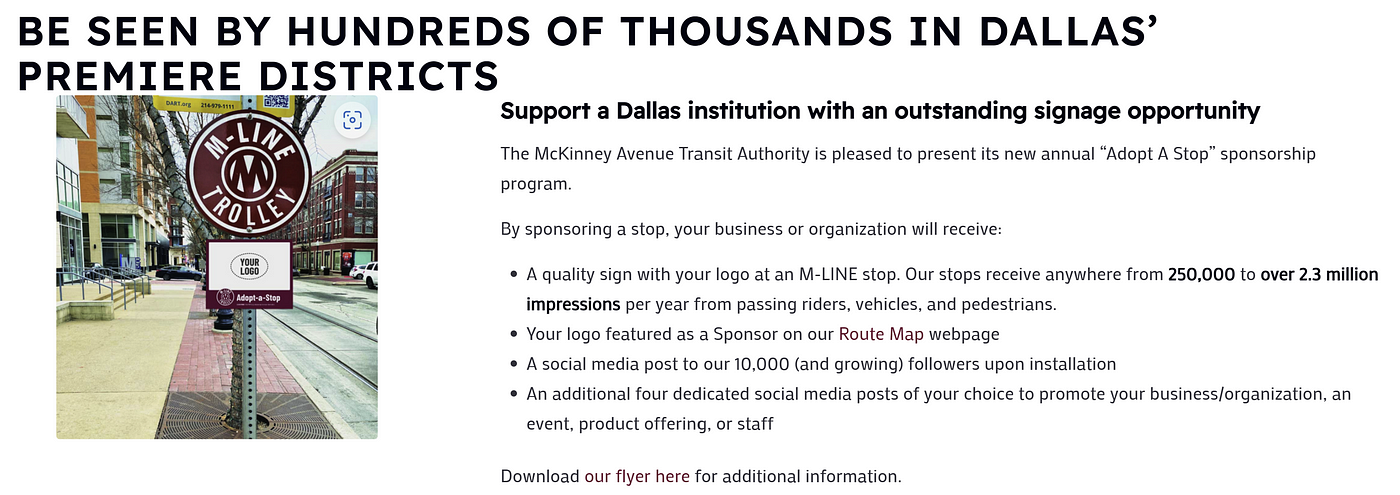 The Adopt-A-Stop webpage on MATA’s website highlights several perks of adopting a stop.
The Adopt-A-Stop webpage on MATA’s website highlights several perks of adopting a stop.
DART used to have an Adopt-A-Stop program, but it shut down several years ago. No one among DART staff that I’ve talked to can remember how the program worked while it was alive. One staffer said the program shut down because DART couldn’t figure out how to make it worthwhile for businesses.
My task for this month is to interview other transit agencies about their Adopt-A-Stop programs. I need to prepare a presentation for the next CAC meeting about my initial vision for the program and research details I’ve uncovered thus far; I’ll turn the presentation into a blog post.
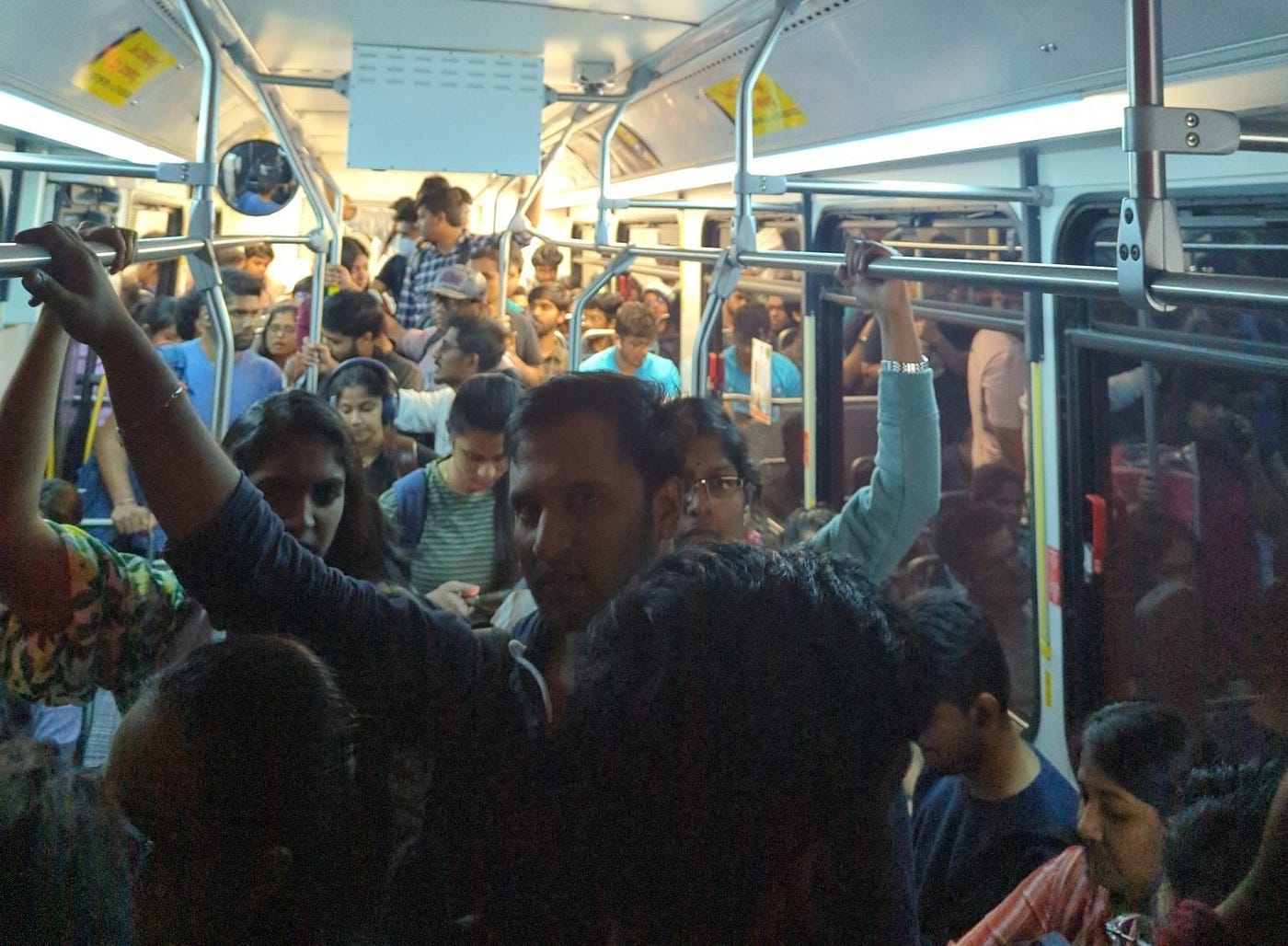 A common scene of overcrowding on Bus 883 East.
A common scene of overcrowding on Bus 883 East.
Project #2: research solutions to overcrowding on UTD shuttle bus. Connor, who is a UTD alum and often rides the 883 buses, brought this to my attention and shared these photos. It’s common for a dozen students to be left behind (without shelter) to wait for the next bus because it is impossible to board any more people.
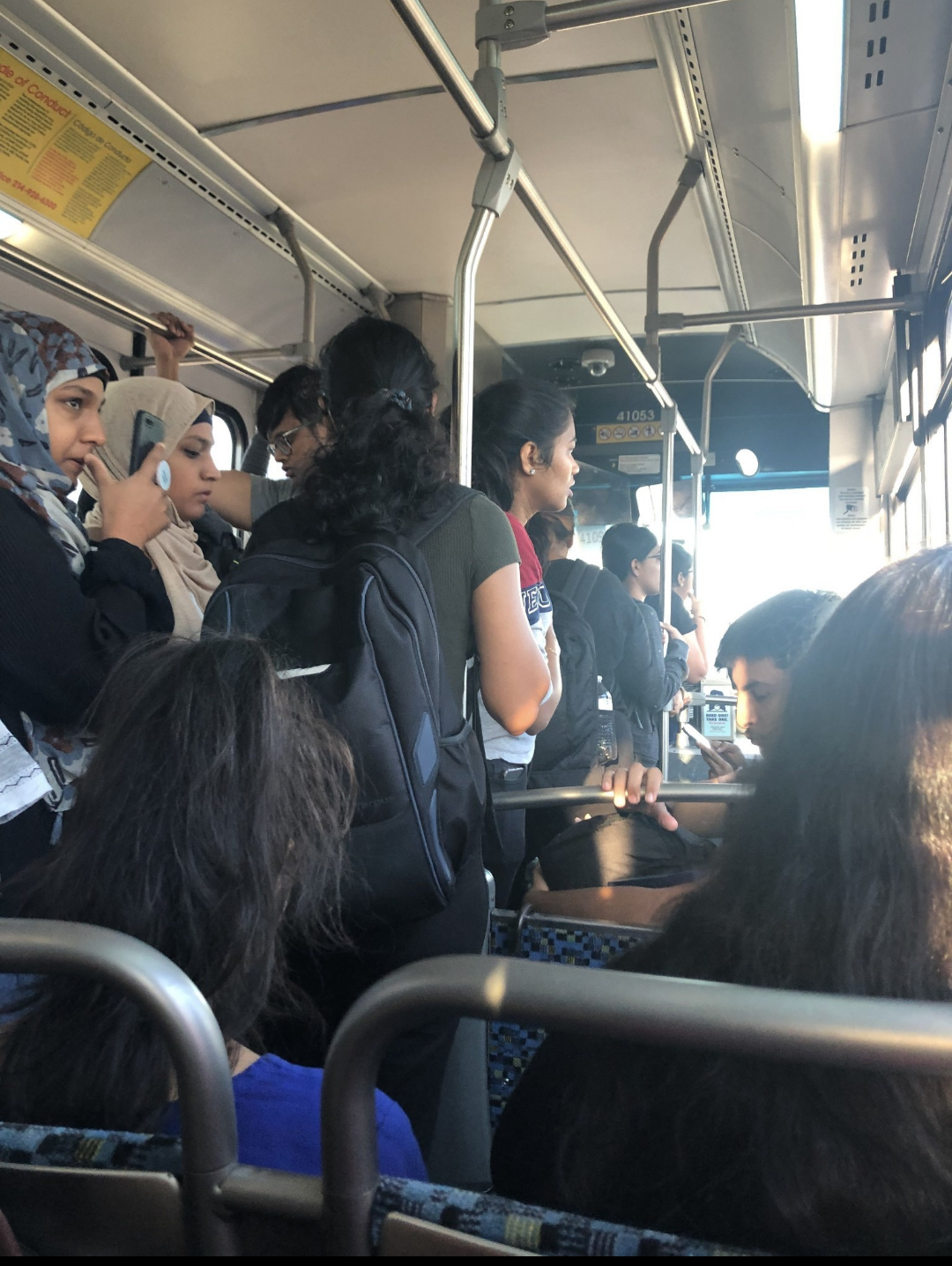 Bus filled front-to-back with students standing in the center aisle.
Bus filled front-to-back with students standing in the center aisle.
At the February CAC meeting, I moved to establish the 883/232 Solutions Subcommittee; the motion carried unanimously. While the CAC itself is composed only of appointees, subcommittee members can be anyone. Last Saturday, we had the first kickoff Zoom call with our subcommittee of UTD students & alumni, including Connor.
Our goal is to produce a slide-deck report with proposed solutions to the overcrowding issue. My role in this project is to simply facilitate meetings and be a “gopher” of information from DART; Connor and Comets for Better Transit will be doing most of the legwork for this project.
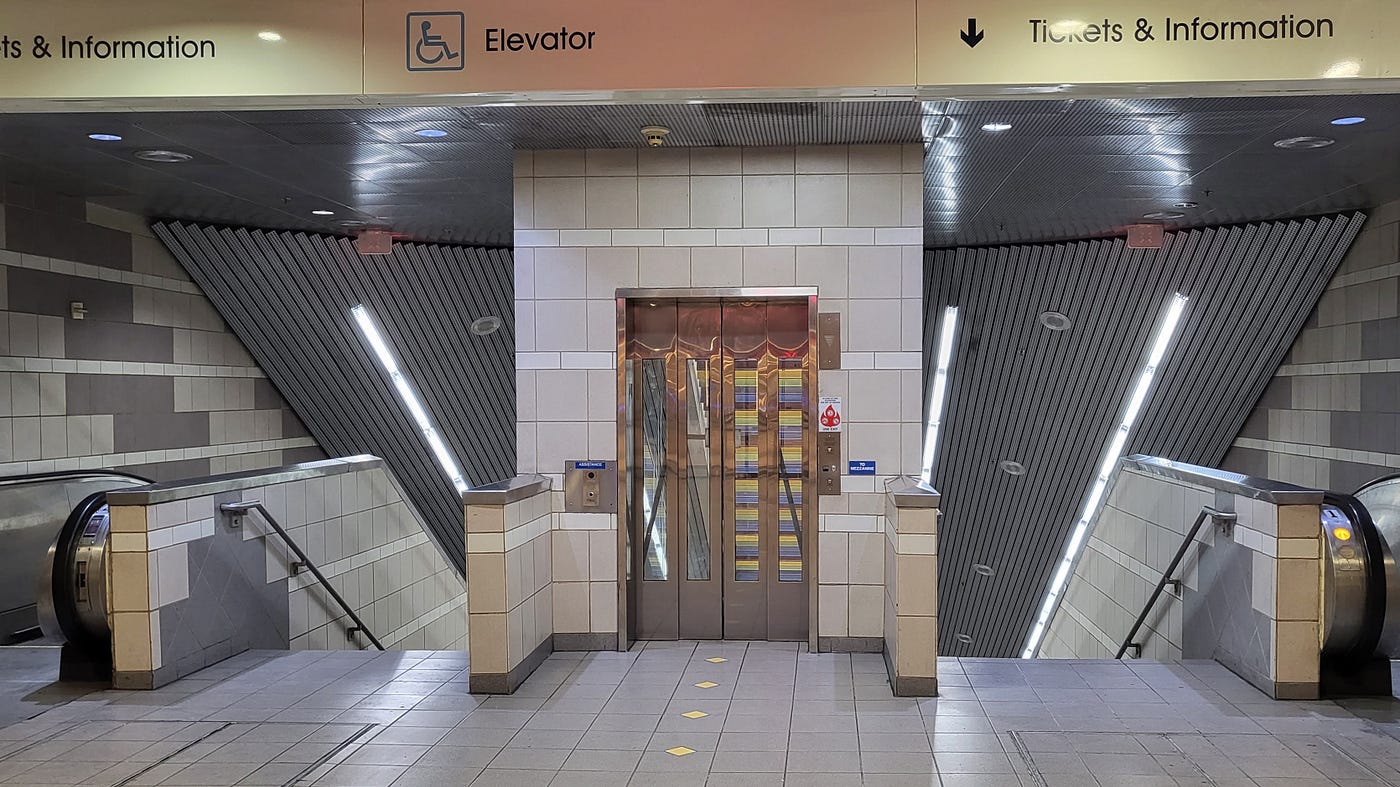
Project #3: propose improvements to safety and cell service in tunnels of Cityplace/Uptown Station. If you’ve ever been in the only subway station in Dallas, you may have noticed there’s no wi-fi or cell service. Due to being 120 feet underground, you can’t access the internet or, most significantly, call for help on your phone.
There are several other issues to be addressed at Cityplace: broken escalators, constant litter, insufficient wayfinding, no restrooms, smoking, and overall sense of claustrophobia. All these issues are solvable.
This subcommittee has two goals: (1) write resolution calling on DART to provide wi-fi and cell service in the Cityplace tunnels, and (2) write report recommending solutions to other issues at Cityplace/Uptown Station. I will contribute heavily to these goals because I happen to live near the station and use it often. Fellow CAC member Stephen Tordella will lead this sub-committee because he has a personal stake in the project due from using the station every day to work at Cityplace Tower (which sits atop the station).
Side Quests in March
While I’d like to do advocacy stuff all day every day, I do have a 9–5 job as a software developer that needs my attention. At a lower level of intensity, here’s what else I’m up to.
Free DART for Students K-12: I was very involved with advising and organizing with Sunrise Movement Dallas early on in this campaign. We made major strides in the past several months. I’ll write a follow-up blog post going into this in more detail. The main thing left for advocates to do is keep pressure on the DART board so that the matter doesn’t get swept under the rug and forgotten. Sunrise Movement is good at that kind of thing, and there’s not much for me to advise on in that department. I’ve taken a backseat on this in recent months.
Dallas Neighbors for Housing (YIMBY Chapter): my advocacy is primarily centered around housing, transit, and walkability. Dallas Neighbors for Housing have been the bat-signal on important hearings and votes related to housing and zoning in the City of Dallas. If I show up at a neighborhood meeting or council hearing and you wonder how I found out about it, 75% of the time it’s because Dallas Neighbors put notice out on Twitter or in an email blast.
Greater Dallas Planning Council: I’ve started attending more of these meetings because I want to connect with the urban planning community in Dallas. I also want to put my finger on the scales of the Convention Center Master Plan and the Fair Park Master Plan. I believe these projects can go one of two ways: tremendous failure or incredible success. I wish for success, but Dallas is not in the habit of exercising the precision and care required for these projects to succeed. I’ll be at the Urban Design Task Force Kickoff Meeting this Tuesday, February 28th.
Parking Code Reform: one of my backlogged podcast episodes will be about parking reform. This Friday, March 3rd, I have a phone call scheduled with the planners responsible for the City of Dallas’ Parking Code Amendment, which hasn’t moved since August 2021.
Baylor University Bearathon: all my cycling around the city has given me a decent amount of cardio activity on a regular basis. But I’m spoiled by the powerful motor on my electric bicycle, so I don’t get as much cardio as I could be getting. On March 24th, Saturday, I’ll run in a half-marathon race for my very first time. I’ll be running every day to get ready!
Contact & Socials
You can email me at hexel@thisdallaslife.com. Most of my tweets (@hexel_co) are advocacy related. My more personal stuff goes on my Instagram (@hexel.co).